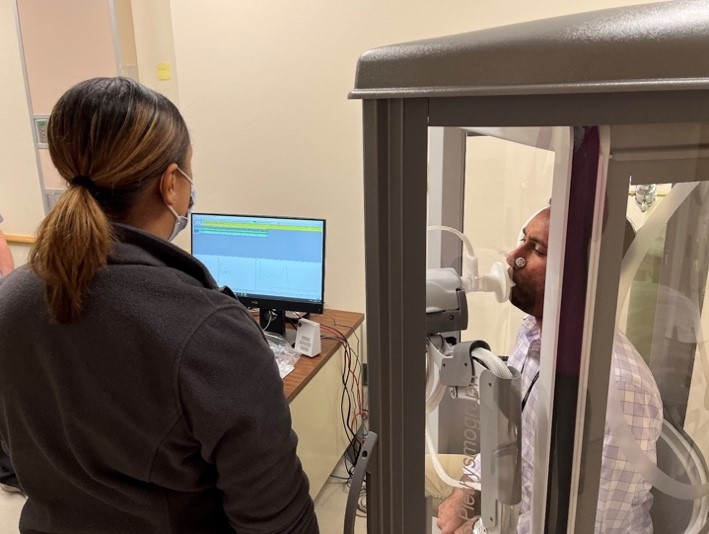Baltimore
Baltimore PDCEN

The Baltimore Post Deployment Cardiopulmonary Evaluation Nework (PDCEN) is located at the Baltimore VA Medical Center (VAMC). The VAMC provides Veterans with exceptional health care, trains the nation's future health care providers, and conducts critical medical research. This research serves as a cornerstone, allowing VA to increase its understanding of Veteran health trends, develop VA scientists and health care leaders and create innovations that advance health care for Veterans and the nation. Also located at the Baltimore VAMC is the Depleted Uraniaum Follow-up Program, established by the VA and Department of Defense to screen and monitor Veterans for health problems associated with exposure to depleted uranium. Hear more about our mission and function from our site director, Dr. Danielle Glick, by watching the video below.

This picture shows traditional pulmonary function testing done at the PDCEN.
The Baltimore PDCEN provides standardized and comprehensive clinical evaluations for identified Veterans enrolled in the Airborne Hazards and Open Burn Pits Registry (AHOBPR) to better identify the relationship between airborne hazards and burn pit exposures and longer-term health outcomes. The PDCEN also identifies and conducts research to improve understanding of health concerns and to identify possible treatments to improve care. The PDCEN is composed of VA physicians with expertise in pulmonary and occupational medicine. The Baltimore PDCEN works collaboratively with the other PDCEN sites to develop new clinical guidelines to care for Veterans who have been exposed to airborne hazards and burn pits.
The Baltimore PDCEN studies various topics related to Veterans' concerns about their post-deployment respiratory health, including respiratory protection and pulmonary function and symptom analysis in occupational exposure groups. Some of our collaborations and scholarly work include:
- Hines, SE, Barnes, AH, Brown, C, Gucer, P, Oliver, MS, Gaitens, JM, Condon, M, McDiarmid, M. Impulse Oscillometry Measurement of Distal Airways Obstruction in Depleted Uranium Exposed Gulf War Veterans. American Journal of Industrial Medicine. 2018:61:308-316
- Glick, DR, Brown, CH, Li, L, Weiler-Lisowski, B, Gaitens, JM, McDiarmid, M, Hines, SE. Longitudinal Evaluation of Lung Function in Gulf War I Veterans Exposed to Depleted Uranium. Journal of Occupational and Environmental Medicine, 2020:62:1059-1062.
- Shah, A, Therkorn, J, Arjomandi, M, Falvo, MJ, Jani, N, Krefft, SD, Osterholzer, JJ, Sotolongo, AM, Hines, SE [Abstract]. Laryngeal Hypersensitivity in a Veteran Cohort with Remote Exposure to Tear Gas and Pepper Spray. American Thoracis Society International Conference, May 2022:A3842. https://www.atsjournals.org/doi/abs/10.1164/ajrccm-conference.2022.205.1_MeetingAbstracts.A3842
- Glick, DR, Gaitens, J, Brown, CH, Reback, MA, Chin, KH, Agnetti, A, McDiarmid, M, Hines, SE [Abstract]. Dyspnea, Wheeze, and Chronic Cough in Blast-Exposed Veterans from the Veterans Affairs Toxic Embedded Fragment Registry. American Thoracis Society International Conference, May 2022:A3844. https://www.atsjournals.org/doi/abs/10.1164/ajrccm-conference.2022.205.1_MeetingAbstracts.A3844
- Sotolongo, A, Falvo, M, Santos, S, Johnson, I, Arjomandi, M, Hines, SE, Krefft, S, Osterholzer, J. Military Burn Pits. Am J Respir Crit Care Med Vol. 201, P13-P14, 2020. https://www.atsjournals.org/doi/pdf/10.1164/rccm.2017P13



















